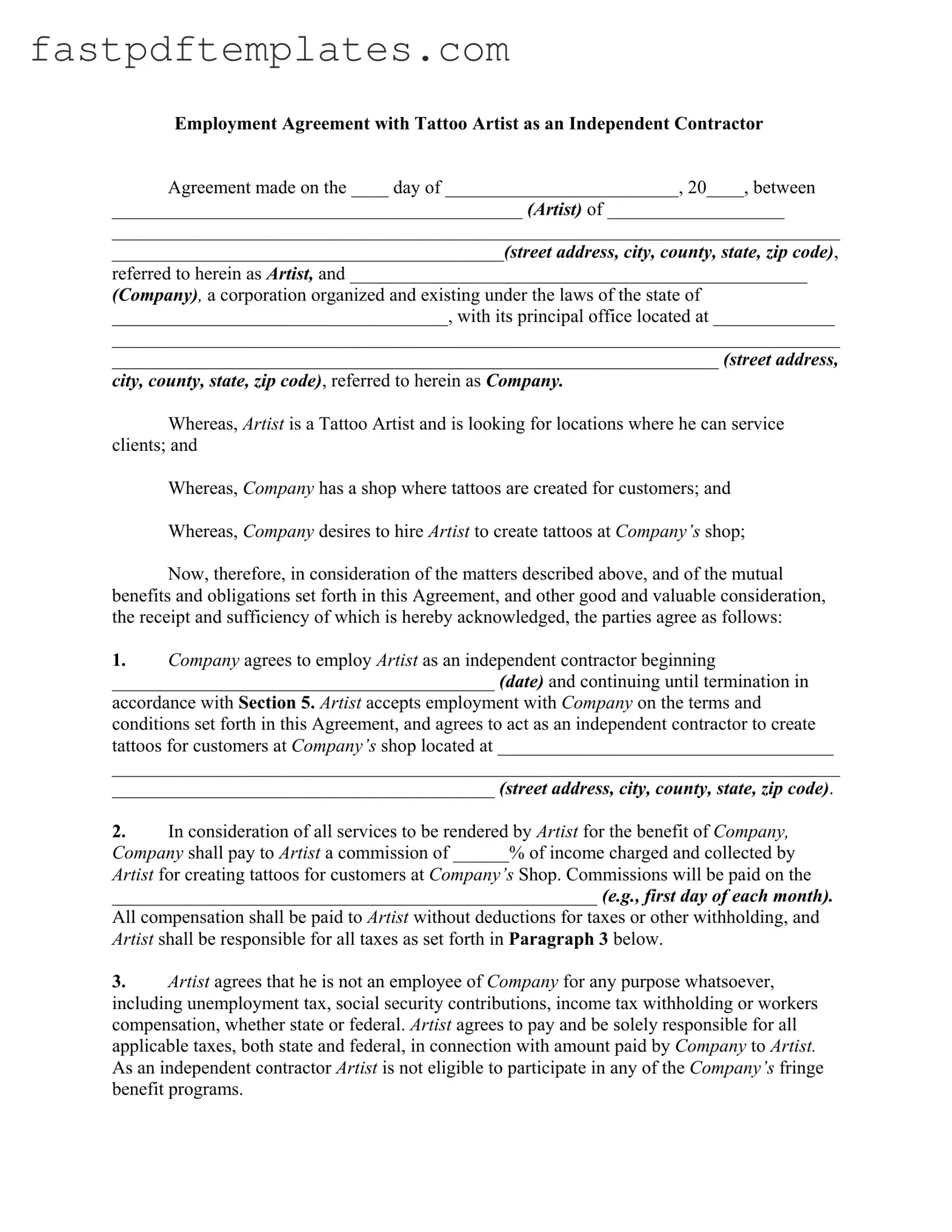Employment Agreement with Tattoo Artist as an Independent Contractor
Agreement made on the ____ day of _________________________, 20____, between
____________________________________________ (Artist) of ___________________
______________________________________________________________________________
__________________________________________(street address, city, county, state, zip code),
referred to herein as Artist, and _________________________________________________
(Company), a corporation organized and existing under the laws of the state of
____________________________________, with its principal office located at _____________
______________________________________________________________________________
_________________________________________________________________ (street address,
city, county, state, zip code), referred to herein as Company.
Whereas, Artist is a Tattoo Artist and is looking for locations where he can service clients; and
Whereas, Company has a shop where tattoos are created for customers; and
Whereas, Company desires to hire Artist to create tattoos at Company’s shop;
Now, therefore, in consideration of the matters described above, and of the mutual benefits and obligations set forth in this Agreement, and other good and valuable consideration, the receipt and sufficiency of which is hereby acknowledged, the parties agree as follows:
1.Company agrees to employ Artist as an independent contractor beginning
_________________________________________ (date) and continuing until termination in accordance with Section 5. Artist accepts employment with Company on the terms and conditions set forth in this Agreement, and agrees to act as an independent contractor to create tattoos for customers at Company’s shop located at ____________________________________
______________________________________________________________________________
_________________________________________ (street address, city, county, state, zip code).
2.In consideration of all services to be rendered by Artist for the benefit of Company, Company shall pay to Artist a commission of ______% of income charged and collected by Artist for creating tattoos for customers at Company’s Shop. Commissions will be paid on the
____________________________________________________ (e.g., first day of each month). All compensation shall be paid to Artist without deductions for taxes or other withholding, and Artist shall be responsible for all taxes as set forth in Paragraph 3 below.
3.Artist agrees that he is not an employee of Company for any purpose whatsoever, including unemployment tax, social security contributions, income tax withholding or workers compensation, whether state or federal. Artist agrees to pay and be solely responsible for all applicable taxes, both state and federal, in connection with amount paid by Company to Artist. As an independent contractor Artist is not eligible to participate in any of the Company’s fringe benefit programs.
4.Artist shall pay all of his own expenses in connection with this Agreement. The only obligation of Company is to pay the applicable commission specified in this Agreement. This Agreement shall become effective on the date stated above, and shall remain in effect for a period of ___________________________________ (e.g., number of weeks, months, or years) unless terminated for breach or as provided in this Agreement.
5.This Agreement may be terminated by mutual agreement of Company and Artist or by written notice of either of the parties to the other party of an intention to terminate the Agreement. Any such written notice shall serve automatically to terminate this Agreement
__________ (number) days after the date such notice is sent to the other party via certified or registered mail.
6.Artist agrees to indemnify and hold harmless Company, its agents and employees, from and against any and all claims, damages, losses, and expenses, including reasonable attorneys' fees arising out of performance of the obligations of Artist under this Agreement that are caused in whole or in part by Artist’s negligent act or omission.
7.Assignment of Contract
Neither of the parties may assign this Agreement or any rights under the Agreement
without the prior written consent of the other party.
8.Governing Law
The parties agree that this agreement shall be governed by and construed pursuant to the
laws of _______________________________________________ (state).
9.Entire Agreement
This Agreement is the complete and exclusive statement of the mutual understanding of
the parties. This Agreement supersedes and cancels all previous written and oral agreements and communications between the parties relating to the subject matter of this Agreement.
10.Amendment
The parties agree that they may amend this Agreement only by a written agreement duly
executed by persons authorized to execute agreements on behalf of the parties.
11.Mandatory Arbitration
Any dispute under this Agreement shall be required to be resolved by binding arbitration of the parties hereto. If the parties cannot agree on an arbitrator, each party shall select one arbitrator and both arbitrators shall then select a third. The third arbitrator so selected shall arbitrate said dispute. The arbitration shall be governed by the rules of the American Arbitration Association then in force and effect.
WITNESS our signatures as of the day and date first above stated.
____________________________________
COMPANY
_______________________________________ |
By_________________________________ |
OWNER |
____________________________________ |
|
(Name and Office in Corporation) |

